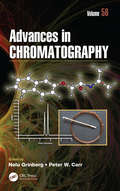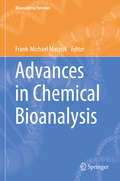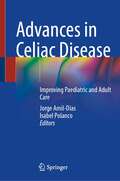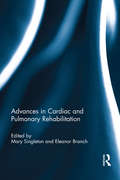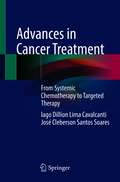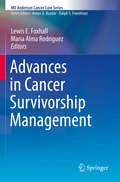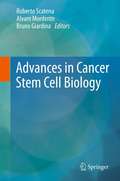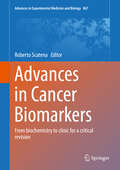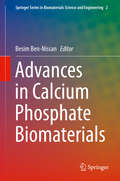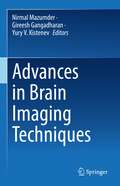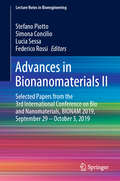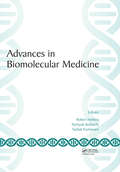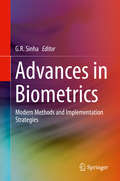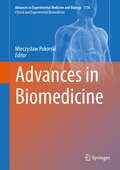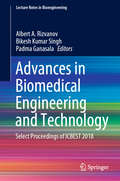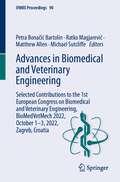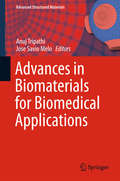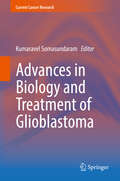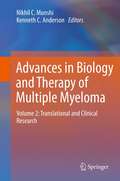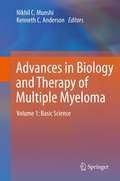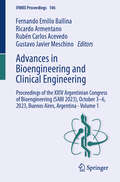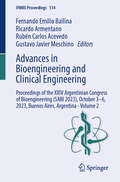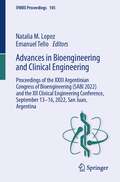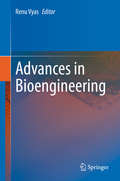- Table View
- List View
Advances in Chromatography: Volume 56 (Advances in Chromatography #Vol. 54)
by Nelu Grinberg Peter W. CarrFor more than five decades, scientists and researchers have relied on the Advances in Chromatography series for the most up-todate information on a wide range of developments in chromatographic methods and applications. The clear presentation of topics and vivid illustrations for which this series has become known makes the material accessible and engaging to analytical, biochemical, organic, polymer, and pharmaceutical chemists at all levels of technical skill. Key Features: Includes a chapter dedicated to Izaak Maurits Kolthoff, offering a unique look at his non-professional life as well as his impact and legacy in Analytical Chemistry. Discusses recent advances in two-dimensional liquid chromatography for the characterization of monoclonal antibodies and other therapeutic proteins. Reviews solvation processes, methodologies of their measurement, and parameters influenced solvation Explores recent advances in TLC analysis of natural colorings, determination of synthetic dyes, and determination of EU-permitted natural colors, in foods. Offers comprehensive and critical insights on the key aspects of CE-MS analysis of intact proteins
Advances in Chemical Bioanalysis (Bioanalytical Reviews #1)
by Frank-Michael MatysikExpert authors provide critical, in-depth reviews of available methods for retrieving selective information out of complex biological systems. Sensors, probes and devices are present and future tools of medicinal diagnostics, environmental monitoring, food analysis and molecular biology. These are based on fluorescence, electrochemistry and mass spectrometry. Coverage of this volume includes sensor development for the detection of small analytes, monitoring of biomolecular interactions, analysis of cellular function, development of diagnostic tools.
Advances in Celiac Disease: Improving Paediatric and Adult Care
by Jorge Amil-Dias Isabel PolancoThis book provides a practical overview of the treatment and management of celiac disease. It examines new data which can be merged with clinical aspects to provide a global perspective for the busy clinician. The disease represents 1% of the population and often goes unnoticed for a long time; however, this book aims to reduce the instance of misdiagnoses of symptoms by providing clear guidance in a single book, with contributions from esteemed experts in the field. Advances in Celiac Disease - Improving Paediatric and Adult Care addresses the clinical characterisation of the disease, in both paediatric and adult populations. The clinical symptoms are clearly defined as well as treatment options and follow-up. This book will be an essential resource for clinicians seeking a clear, concise resource to identifying, treating, and managing celiac disease in both adults and children.
Advances in Cardiac and Pulmonary Rehabilitation
by Susan S Rose Eleanor F BranchEnhance your rehabilitation program with this authoritative volume. Experts from the Department of Physical Therapy of Duke University Medical Center in Durham, North Carolina, explore the most current developments in cardiac and pulmonary rehabilitation. Reading this highly practical volume will provide you with insight into the current status and future trends of pulmonary rehabilitation, supply you with rationale and supporting data for physiological and psychological mechanisms that seem to influence the pulmonary rehabilitation process, and illustrate the successes of both a hospital-based and a community-based pulmonary rehabilitation program. Valuable chapters on the physical therapy interventions required by and designed for coronary bypass surgery patients and heart transplantation patients will offer you additional useful information. Advances in Cardiac and Pulmonary Rehabilitation is an ideal resource for professionals, including physical therapists, who are or who wish to become, involved in the care of patients with cardiac or chronic pulmonary disorders.
Advances in Cancer Treatment: From Systemic Chemotherapy to Targeted Therapy
by Iago Dillion Cavalcanti José Cleberson SoaresThis work covers the pathophysiology of cancer, exploring the difficulty of optimal treatment due to the complexity and diversity of cancer types. The search for distinctive molecular biology characteristics of tumor cells is especially relevant in the identification of overexpressed receptors and proteins that can be used as a target for cancer treatment.We highlight the main therapeutic modalities, particularly conventional systemic chemotherapy, addressing its mechanisms of action, therapeutic classes and even the toxic effects. We also describe the main tumor markers, their importance in the diagnosis and treatment of cancer, and the specificity of tumor cells. The first chapters serve as an introduction to the central topic of this book, targeted therapy. Key aspects of target therapy, such as classes of drugs, immunotherapy, monoclonal antibodies, checkpoint inhibitors, cancer vaccines and tyrosine kinase inhibitors are presented, and, for each one, the benefits, as well as the adverse effects are reported. Chapter 6 compares conventional systemic chemotherapy and targeted therapy, identifies the risks and benefits and also the eligibility criteria for patient care. The possibility of targeted therapy replacing conventional chemotherapy is discussed while reviewing studies that demonstrate the benefits of combining both types of treatment. Finally, the introduction of pharmaceutical nanotechnology to improve antineoplastic agents is addressed in the last chapter and sets the direction for future research in cancer treatment. This is a valuable resource for many health professionals including physicians, pharmacists, nurses, researchers and students interested in the field of oncology.
Advances in Cancer Survivorship Management (MD Anderson Cancer Care Series)
by Lewis E. Foxhall Maria Alma RodriguezThis volume presents the MD Anderson experience in providing care and services to the rapidly growing population of cancer survivors, which is currently estimated to be 12 million in the United States and more than 25 million worldwide. As cancer survival rates have increased, it has slowly become clear that the challenges faced by people with cancer do not end with treatment but simply change. This book aims to assist community oncologists, physicians, and their staff, who care for the vast majority of cancer survivors, by disseminating models of surveillance for disease recurrence, screening for second primary cancers, education regarding potential late effects of treatment, and psychosocial counseling. These models have proven valuable to cancer survivors who receive care at MD Anderson.
Advances in Cancer Stem Cell Biology
by Alvaro Mordente Bruno Giardina Roberto ScatenaIn recent years, cancer stem cells have been recognized as important component in carcinogenesis and they seem to form the basis of many (if not all) tumor types. Cancer stem cells or "cancer cell like stem cells" have been isolated from various cancers of different origin (blood, breast, brain, skin, head and neck, thyroid, cervix, lung, retina, colon, pancreas and so on). Cancer stem cells - rare cells with indefinite proliferative potential that drive the formation and growth of tumours- seem to show intriguing relationships with physiological stem cells. Specifically, these cancer cells show significant similarities in the mechanisms that regulate self-renewal of normal stem cells. Moreover, tumour cells might directly arise from normal stem cells. Further, the cellular biology of cancer stem cells show a lot of similarities with normal stem cells.
Advances in Cancer Biomarkers: From biochemistry to clinic for a critical revision (Advances in Experimental Medicine and Biology #867)
by Roberto ScatenaAt present there are a growing number of biomolecules under investigation to understand their potential role as cancer biomarker for diagnostic, prognostic and therapeutic purposes. Intriguingly, the state of art on cancer biomarkers research shows interesting and promising results together to clamorous failures. Also from a clinical point of view, there are contradictory results on routine clinical use of the present cancer biomarkers. Some patients may be simply monitored in their course by a periodic blood sample, but sometimes this monitoring shows dramatic limits. A lot of patients show serious and extensive relapses without significant change in serum concentrations of biomarkers tested. Often the physician who should utilize these biomarker does not entirely know their limits and the total potential applications as well and sometimes this knowledge is influenced by economical and marketing strategies. This limited and "polluted" knowledge may have dramatic consequences for patient. The aim of this book is to diffuse all aspects of cancer biomarkers, from their biochemical peculiarities to all clinical implications by passing through their physiology and pathophysiology. This critical approach towards old and new cancer biomarkers should foster a deepened and useful understanding of the diagnostic and prognostic index of these fundamental parameters of laboratory medicine and in the same time facilitating the research of new and more sensitive-specific signals of the cancer cell proliferation.
Advances in Calcium Phosphate Biomaterials (Springer Series in Biomaterials Science and Engineering #2)
by Besim Ben-NissanAdvances in Calcium Phosphate Biomaterials presents a comprehensive, state-of-the-art review of the latest advances in developing calcium phosphate biomaterials and their applications in medicine. It covers the fundamental structures, synthesis methods, characterization methods, and the physical and chemical properties of calcium phosphate biomaterials, as well as the synthesis and properties of calcium phosphate-based biomaterials in regenerative medicine and their clinical applications. The book brings together these new concepts, mechanisms and methods in contributions by both young and "veteran" academics, clinicians, and researchers to forward the knowledge and expertise on calcium phosphate and related materials. Accordingly, the book not only covers the fundamentals but also open new avenues for meeting future challenges in research and clinical applications. Besim Ben-Nissan is a Professor of Chemistry and Forensic Science at the University of Technology, Sydney, Australia
Advances in Brain Imaging Techniques
by Nirmal Mazumder Gireesh Gangadharan Yury V. KistenevThe book reviews the recent developments in brain imaging and their technological advancements to understand molecular mechanisms associated with neurological disorders and basic behaviors in humans and rodents at the structural, molecular, and functional levels. It discusses the usefulness of advanced optical microscopy techniques, including optical coherence tomography (OCT), miniscope, multiphoton fluorescence (2PF & 3PF), adaptive optics, harmonic generation, and Raman microscopy for understanding pathomechanism of brain disorders and pathological and physiological changes associated with neurodegenerative diseases. Also, the book presents conventional imaging modalities, including Magnetic Resonance Imaging (MRI), for delineating underlying mechanisms and precise early diagnosis of neurological disorders. This book is a useful resource for neuroscientists and researchers working in biomedical engineering and optics.
Advances in Bionanomaterials II: Selected Papers from the 3rd International Conference on Bio and Nanomaterials, BIONAM 2019, September 29 – October 3, 2019 (Lecture Notes in Bioengineering)
by Stefano Piotto Simona Concilio Lucia Sessa Federico RossiThis book presents multidisciplinary research focusing on the analysis, synthesis, and design of bio and nanomaterials. Merging biophysics, biochemistry, and bioengineering perspectives, it discusses the basic properties of materials and their interaction with biological systems; the development of new medical devices, such as implantable systems; and new algorithms and methods for modeling the mechanical, physical, and biological properties of biomaterials. The book gathers the proceedings of the 3rd International Conference on Bio and Nanomaterials, held on September 29–October 3, 2019, on an MSC cruise ship navigating the Mediterranean Sea. It particularly highlights Horizon 2020 projects, covering topics such as novel synthetic strategies for nanomaterials, the implementation of bio- and smart materials for pharmacological and medical purposes, as well as environmental applications. Intended for a broad audience of academics and professionals, it offers a comprehensive and timely snapshot of the field of biomaterials. In addition to a set of innovative theories together with the necessary practical tools for their implementation, it also addresses the current challenges in the field, fostering new discussions and possible future collaborations between diverse groups.
Advances in Biomolecular Medicine: Proceedings of the 4th BIBMC (Bandung International Biomolecular Medicine Conference) 2016 and the 2nd ACMM (ASEAN Congress on Medical Biotechnology and Molecular Biosciences), October 4-6, 2016, Bandung, West Java, Indonesia
by Robert HofstraAdvances in Biomolecular Medicine contains the selected papers presented at the 4th BIBMC (Bandung International Biomolecular Medicine Conference) and the 2nd ACMM (ASEAN Congress on Medical Biotechnology and Molecular Biosciences), hosted by the Faculty of Medicine, Padjadjaran University, Bandung, West Java, Indonesia, 4-6 October 2016. In line with the United Nations Sustainable Development Goals, the theme of the joint scientific meeting is ‘Medical innovation & translational research to ensure healthy lives & promote well-being for all at all ages’. Authors include scientists, academics, practitioners, regulators and other key individuals with expertise and experience relevant to biomolecular medicine, medical biotechnology and molecular biosciences. Topics of the papers cover various aspects of infection, oncology, tuberculosis, genetics, thalassemia, nutrition, cardiovascular, wound healing and endocrinology. This book is essential reading for academics, scientist, practitioners and regulators involved in the area of biomolecular medicine, medical biotechnology and molecular biosciences.
Advances in Biometrics: Modern Methods and Implementation Strategies
by G. R. SinhaThis book provides a framework for robust and novel biometric techniques, along with implementation and design strategies. The theory, principles, pragmatic and modern methods, and future directions of biometrics are presented, along with in-depth coverage of biometric applications in driverless cars, automated and AI-based systems, IoT, and wearable devices. Additional coverage includes computer vision and pattern recognition, cybersecurity, cognitive computing, soft biometrics, and the social impact of biometric technology. The book will be a valuable reference for researchers, faculty, and practicing professionals working in biometrics and related fields, such as image processing, computer vision, and artificial intelligence.Highlights robust and novel biometrics techniquesProvides implementation strategies and future research directions in the field of biometricsIncludes case studies and emerging applications
Advances in Biomedicine (Advances in Experimental Medicine and Biology #1176)
by Mieczyslaw PokorskiThis book gathers multidisciplinary articles that present advances of our understanding of diseases and the effective treatment of patients. The authors share recent clinical and experimental research findings, highlighting poorly understood areas with uncertain treatment outcomes, such as giant-cell bone tumors and their propensity to metastasize to the lungs; subterranean rehabilitation in pulmonary disorders; male reproductive hormone regulation during physical exercise in hyperbaric, hyperoxic environments, like underwater diving; and amelioration of cognitive decline owing to increased cerebral blood transit time after internal carotid artery stenting. Other topics include new concepts and innovations in the treatment of diabetes in pregnancy, and leg ulcers in chronic venous insufficiency, as well as molecular research on the toxic effects of oxidative stress, impaired cell autophagy, and experimental conditions resembling air pollution. Featuring the latest interdisciplinary advances in biomedicine, this book is a valuable resource for medical professionals, both academics and practitioners, and all allied health-care workers.
Advances in Biomedical Engineering and Technology: Select Proceedings of ICBEST 2018 (Lecture Notes in Bioengineering)
by Albert A. Rizvanov Bikesh Kumar Singh Padma GanasalaThis book comprises select peer-reviewed papers presented at the International Conference on Biomedical Engineering Science and Technology: Roadway from Laboratory to Market (ICBEST 2018) organized by Department of Biomedical Engineering, National Institute of Technology Raipur, Chhattisgarh, India. The book covers latest research in a wide range of biomedical technologies ranging from biomechanics, biomaterials, biomedical instrumentation to tele-medicine, internet of things, bioinformatics, medical signal and image processing. The contents aim to bridge the gap between laboratory research and feasible market products by identifying potential technologies to enhance functionalities of diagnostic and therapeutic devices. The book will be of use to researchers, biomedical engineers, as well as medical practitioners.
Advances in Biomedical and Veterinary Engineering: Selected Contributions to the 1st European Congress on Biomedical and Veterinary Engineering, BioMedVetMech 2022, October 1–3, 2022, Zagreb, Croatia (IFMBE Proceedings #90)
by Matthew Allen Michael Sutcliffe Petra Bonačić Bartolin Ratko MagjarevićThis book gathers selected peer-reviewed contributions to the 1st European Congress on Biomedical and Veterinary Engineering, BioMedVetMech 2022, held on October 1–3, 2022, in Zagreb, Croatia. It offers a timely snapshot of research findings and advances technologies in the area of biomechanics, rehabilitation and surgery. It covers applications of brain-computer interface, virtual reality and functional electrical stimulation, among others.
Advances in Biomaterials for Biomedical Applications (Advanced Structured Materials #66)
by Anuj Tripathi Jose Savio MeloThis book highlights recent advances in the field of biomaterials design and the state of the art in biomaterials applications for biomedicine. Addressing key aspects of biomaterials, the book explores technological advances at multi-scale levels (macro, micro, and nano), which are used in applications related to cell and tissue regeneration. The book also discusses the future scope of bio-integrated systems. The contents are supplemented by illustrated examples, and schematics of molecular and cellular interactions with biomaterials/scaffolds are included to promote a better understanding of the complex biological mechanisms involved in material-to-biomolecule interactions. The book also covers factors that govern cell growth, differentiation, and regeneration in connection with the treatment and recovery of native biological systems. Tissue engineering, drug screening and delivery, and electrolyte complexes for biomedical applications are also covered in detail. This book offers a comprehensive reference guide for multi-disciplinary communities working in the area of biomaterials, and will benefit researchers and graduate students alike.
Advances in Biomaterials
by Stuart M. LeeThis book discusses advanced instrumental techniques for the rapid bioassay of toxic materials, creep analysis of Delrin stents in cardiac bioprosthesis devices using finite element analysis, and the potential use of electron spectroscopy for chemical analysis for study of biomaterial surface.
Advances in Biology and Treatment of Glioblastoma (Current Cancer Research)
by Kumaravel SomasundaramThis volume covers the most important areas of glioblastoma - surgical resection, molecular pathology, targeted therapies, cancer stem cells, the role of DNA methylation, targeted sequencing for personalized therapy, animal models and advances in pediatric glioblastoma. Chapter authors are junior and senior investigators, who are well established in their particular areas and include neurosurgeons, neuropathologists, neurooncologists and basic scientists.
Advances in Biology and Therapy of Multiple Myeloma, Volume 2: Volume 2: Translational and Clinical Research
by Nikhil C. Munshi Kenneth C. AndersonDespite the advances in conventional, novel agent and high dose chemotherapy multiple myeloma (MM) remains incurable. In order to overcome resistance to current therapies and improve patient outcome, novel biologically-based treatment approaches are being developed. Current translational research in MM focusing on the development of molecularly-based combination therapies has great promise to achieve high frequency and durable responses in the majority of patients. Two major advances are making this goal possible. First, recent advances in genomics and proteomics in MM have allowed for increased understanding of disease pathogenesis, identified novel therapeutic targets, allowed for molecular classification, and provided the scientific rationale for combining targeted therapies to increase tumor cell cytotoxicity and abrogate drug resistance. Second, there is now an increased understanding of how adhesion of MM cells in bone marrow (BM) further impacts gene expression in MM cells, as well as in BM stromal cells (BMSCs). As a result of these advances in oncogenomics on the one hand and increased understanding of the role of the BM in the pathogenesis of MM on the other, a new treatment paradigm targeting the tumor cell and its BM microenvironment to overcome drug resistance and improve patient outcome has now been developed. Thalidomide, lenalidomide, and Bortezomib are three agents which target the tumor cell in its microenvironment in both laboratory and animal models and which have rapidly translated from the bench to the bedside. Ongoing efforts are using oncogenomics and cell signaling studies to identify next generation of therapies in MM on the one hand, and to inform the design of combination trials on the other. This new paradigm for overcoming drug resistance and improving patient outcome in MM has great promise not only to change the natural history of MM, but also to serve as a model for targeted therapeutics directed to improve outcome of patients with MM.
Advances in Biology and Therapy of Multiple Myeloma: Volume 1: Basic Science
by Nikhil C. Munshi Kenneth C. AndersonDespite the advances in conventional, novel agent and high dose chemotherapy multiple myeloma (MM) remains incurable. In order to overcome resistance to current therapies and improve patient outcome, novel biologically-based treatment approaches are being developed. Current translational research in MM focusing on the development of molecularly-based combination therapies has great promise to achieve high frequency and durable responses in the majority of patients. Two major advances are making this goal possible. First, recent advances in genomics and proteomics in MM have allowed for increased understanding of disease pathogenesis, identified novel therapeutic targets, allowed for molecular classification, and provided the scientific rationale for combining targeted therapies to increase tumor cell cytotoxicity and abrogate drug resistance. Second, there is now an increased understanding of how adhesion of MM cells in bone marrow (BM) further impacts gene expression in MM cells, as well as in BM stromal cells (BMSCs). As a result of these advances in oncogenomics on the one hand and increased understanding of the role of the BM in the pathogenesis of MM on the other, a new treatment paradigm targeting the tumor cell and its BM microenvironment to overcome drug resistance and improve patient outcome has now been developed. Thalidomide, lenalidomide, and Bortezomib are three agents which target the tumor cell in its microenvironment in both laboratory and animal models and which have rapidly translated from the bench to the bedside. Ongoing efforts are using oncogenomics and cell signaling studies to identify next generation of therapies in MM on the one hand, and to inform the design of combination trials on the other. This new paradigm for overcoming drug resistance and improving patient outcome in MM has great promise not only to change the natural history of MM, but also to serve as a model for targeted therapeutics directed to improve outcome of patients with MM.
Advances in Bioengineering and Clinical Engineering: Proceedings of the XXIV Argentinian Congress of Bioengineering (SABI 2023), October 3–6, 2023, Buenos Aires, Argentina - Volume 1 (IFMBE Proceedings #106)
by Ricardo Armentano Fernando Emilio Ballina Rubén Carlos Acevedo Gustavo Javier MeschinoThis book offers a timely snapshot of research, technologies and best practices in the broad area of bioengineering and clinical engineering. It reports on advances in biomechanics, biomedical image processing, biomaterials and tissue engineering. Further, it covers applications of artificial intelligence in biology and medicine, and instrumentation. Gathering the first volume of the proceedings of the XXIV Argentinian Congress of Bioengineering (SABI 2023), held on October 3–6, 2023, in Buenos Aires, Argentina - and organised by the Sociedad Argentina de Bioingeniería, this book provides an extensive source of information for both researchers and professionals in biomedical and clinical engineering.
Advances in Bioengineering and Clinical Engineering: Proceedings of the XXIV Argentinian Congress of Bioengineering (SABI 2023), October 3–6, 2023, Buenos Aires, Argentina - Volume 2 (IFMBE Proceedings #114)
by Ricardo Armentano Fernando Emilio Ballina Rubén Carlos Acevedo Gustavo Javier MeschinoThis book offers a timely snapshot of research, technologies and best practices in the broad area of bioengineering and clinical engineering. Contributions report on advances in biomedical signal processing, biosystem models and 3D printing applications, clinical engineering, and neuromuscolar system analysis and rehabilitation engineering. They also cover developments in bioengineering education. Gathering the second volume of the proceedings of the XXIV Argentinian Congress of Bioengineering (SABI 2023), held on October 3–6, 2023, in Buenos Aires, Argentina - and organised by the Sociedad Argentina de Bioingeniería, this book provides an extensive source of information for both researchers and professionals in biomedical and clinical engineering.
Advances in Bioengineering and Clinical Engineering: Proceedings of the XXIII Argentinian Congress of Bioengineering (SABI 2022) and the XII Clinical Engineering Conference, September 13–16, 2022, San Juan, Argentina (IFMBE Proceedings #105)
by Natalia M. Lopez Emanuel TelloThis book offers a timely snapshot of research, technologies and best practices in the broad area of bioengineering and clinical engineering. Contributions report on advances in biomechanics, biomaterials, and tissue engineering, biosensors and instrumentation, biomedical signal processing, and rehabilitation engineering. Further, it covers topics relating to quality engineering and management of health services, and of engineering education. The book gathers selected, peer-reviewed contributions to the XXIII Argentinian Congress of Bioengineering and the XII Clinical Engineering Conference, both known under the acronym “SABI 2022”, held on September 13–16, 2022, in San Juan, Argentina, and organized by the Sociedad Argentina de Bioingeniería.
Advances in Bioengineering
by Renu VyasThis book provides a single source of information on three major bioengineering areas: engineering at the cellular and molecular level; biomedical devices / instrument engineering; and data engineering. It explores the latest strategies that are essential to advancing our understanding of the mechanisms of human diseases, the development of new enzyme-based technologies, diagnostics, prosthetics, high-performance computing platforms for managing huge amounts of biological data, and the use of deep learning methods to create predictive models. The book also highlights the growing importance of integrating chemistry into life sciences research, most notably concerning the development and evaluation of nanomaterials and nanoparticles and their interactions with biological material. The underlying interdisciplinary theme of bioengineering is addressed in a range of multifaceted applications and worked out examples provided in each chapter.
